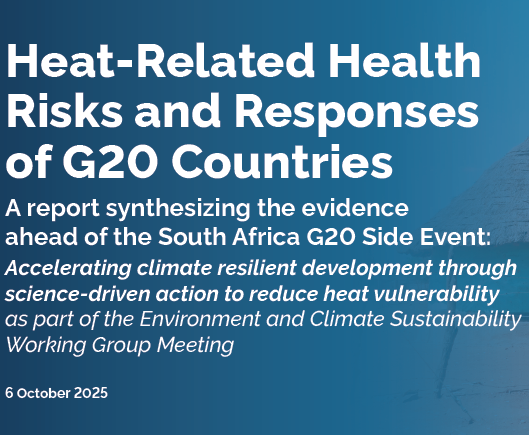Heat-Related Health Risks and Responses of G20 Countries

Heat-Related Health Risks and Responses of G20 Countries
A report synthesizing the evidence ahead of the South Africa G20 Side Event:
Accelerating climate resilient development through science-driven action to reduce heat vulnerability as part of the Environment and Climate Sustainability Working Group Meeting
Executive Summary
Extreme heat has emerged as one of the most pressing and inequitable global health challenges of our time. The World Meteorological Organization confirmed 2024 as the hottest year in recorded history, marking the first time that global temperatures exceeded the 1.5°C threshold set by the Paris Agreement. Across G20 countries, heatwaves are becoming longer, more intense, and more frequent, compounding health, economic, and social vulnerabilities. Heat-related deaths already exceed 489,000 per year globally, with billions of workers regularly exposed to unsafe temperatures. The urgency of this crisis has been recognized through the United Nations Secretary-General’s Call to Action on Extreme Heat and multiple national and multilateral initiatives to strengthen resilience.
This report synthesizes the evidence on heat-related health risks, adaptation measures, and governance responses across G20 countries ahead of the South African G20 Presidency’s Environment and Climate Sustainability Working Group. It highlights both progress and persistent gaps in policy, planning, and implementation. While many G20 countries have developed Heat Action Plans (HAPs) or equivalent strategies, these remain uneven in scope, coordination, and sustainability. Vulnerable populations—such as informal settlement dwellers, outdoor workers, and low-income communities—continue to face disproportionate risks, underscoring the need for inclusive, locally relevant, and data-driven interventions.
The analysis calls for a new phase of science-driven, multisectoral action that transcends short-term responses. Improving the science of heat-health—integrating biometeorology, physiology, climatology, and public health—can enhance the effectiveness and applicability of HAPs. Coordinated governance, legal mandates, comprehensive vulnerability assessments, and long-term resilience planning must underpin future strategies. Only through an integrated approach—linking research, policy, and community engagement—can G20 nations collectively reduce heat-related morbidity and mortality and accelerate climate-resilient development that safeguards health and equity.
This is a draft report that is being shared as part of a side event titled ‘Accelerating climate resilient development through science-driven action to reduce heat vulnerability’ as part of the Environment and Climate Sustainability Working Group Meeting. We welcome feedback to update and/or amend the contents of this report. Email Prof Caradee Wright: cwright@mrc.ac.za
View or Download the complete Heat-Related Health Risks and Responses of G20 Countries - Report
